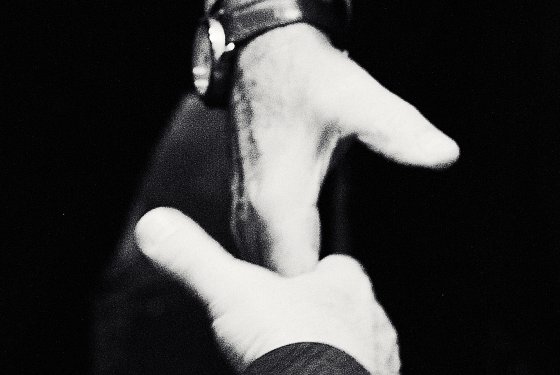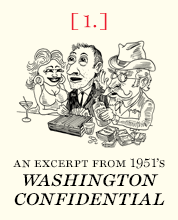The Stench of the Potomac
Washington may be a dysfunctional place to govern, but it’s working better than ever as a marketplace for cashing in. And that’s thanks, more than anything, to the Democratic Establishment.
 |
(Photo: Christopher Anderson/Magnum Photos)
|
You’d think that the market for Washington-bashing would be saturated by now. Not counting the nightly Comedy Central duo, four anti-Washington television shows were showered with Emmy nominations last month. Apocalyptic anti-Washington books with titles like It’s Even Worse Than It Looks and Throw Them All Out have become our daily bread in the Obama years—although none of them matches Jack Lait and Lee Mortimer’s Truman-era Washington Confidential, an enormous best seller in 1951 and forever to be cherished for describing the town (my hometown, I must disclose) as “the nation’s Forest Lawn, where is sunk its priceless heritage, killed by countless generations of getters and gimme-ers.”
Such bile never goes out of fashion. This is proving the summer of This Town, Mark Leibovich’s jaundiced take on “America’s gilded capital,” which leapt up the best-seller list the week of its publication, where it’s poised to end Sheryl Sandberg’s lock on No. 1. As if to ratify its relevance, its release was greeted by a new NBC News–Wall Street Journal poll in which Congress’s approval rating fell to an all-time low (12 percent) in that survey’s history, raising the prospect that it could flatline to zero if the government shuts down come fall. Though President Obama’s rating (45 percent) wasn’t stellar either, do pity John Boehner, who would have been the most unpopular man in America had the field not included Edward Snowden and George Zimmerman, the only names that polled worse.
Leibovich’s survey of the swamp on the Potomac during the Obama years would be worth reading just to see him torture David Gregory of NBC News, whose naked ambition has so riled the locals you wonder if Marion Barry might be held in higher regard. But the humor of This Town is spiked with mortality. It opens in June 2008 with the invitation-only Kennedy Center memorial for Tim Russert, the departed unofficial mayor of what Leibovich calls the Club—the “spinning cabal of ‘people in politics and media’ ” that rules Beltway society. The book closes late last year, with a Christmas fête convened by the town’s unofficial king and queen, Ben Bradlee and Sally Quinn, at their Georgetown manse. In Leibovich’s telling, this A-list holiday gathering was more funereal than the Russert funeral.
As he writes, at least “the room was alive” at the Russert send-off—alive with the greasy clamor of those trying to advance their status by proving that Tim loved them most of all. The Bradlee-Quinn soirée, by contrast, comes off like a waxwork, and not just because of the hostess’s decision to dub it “the Last Party” in aspirationally au courant homage to the looming “end of the world” on the Mayan calendar. Greeting guests, the 91-year-old Bradlee, the godfather of Washington journalism for half a century, was visibly slipping away into dementia, fading much like his fabled newspaper in the new age of Politico. The crowd of invitees was “mostly old,” with few journalists (or anyone else, with the possible exception of the help) under the age of 40—“The Masque of the Red Death” minus the fashion sense.
The principal players in This Town also trend old. Blacks (a few members of the Obama administration and two former Bush Cabinet officers excepted), Hispanics, and gays are in short supply. So is the 99 percent. The gaping demographic disconnect between the town’s aging aristocracy and the rest of the city’s citizenry, not to mention much of the nation beyond the District’s borders, in some ways parallels the crisis of the present-day Republican Party. But the Club, unlike the GOP, is not in crisis. And to a large extent it is not Republican. For all the ink generated by This Town in its short life, its distinctive contribution to its genre has often been lost in the gossip. The book is as much an indictment of the Democratic Establishment as it is of the Washington Establishment. And the two are often synonymous.
That’s why the book is funny only up to a point. Delicious as it is to watch preening boldface names make asses of themselves as they network at the White House Correspondents’ Dinner, the Aspen Ideas Festival, talk-show greenrooms, and the incessant book parties for books no one will open, what lingers from This Town is what will linger in Washington well after its current dinosaurs are extinct: the political culture owned by big money, Wall Street and otherwise, that the Democrats, no less than the Republicans, have done their best to perpetuate over the past two decades. At least Mitt Romney didn’t pretend to care about the hoi polloi below. Democrats once did.
Along with George Packer’s The Unwinding, a journalistic distillation of Great Recession–era America that is anything but comic, This Town is the second best seller this year to emphasize the Democrats’ role in Washington’s corruption. Both are authored by staff writers at liberal publications. (Leibovich is at the Times, Packer at The New Yorker.) In both cases, this theme is secondary to the main narrative. That’s why The Unwinding, a Dos Passos–inspired epic effort to convey “An Inner History of the New America,” is better known for its poignant portraits of everyday Americans largely invisible to official Washington. It’s also why This Town is getting more attention for its sightings of the inveterate Beltway hostess Tammy Haddad and the pathologically compulsive party attendees Alan Greenspan and Andrea Mitchell than for its mockery of behind-the-scenes characters like Mark Penn and Jack Quinn. If you read both books—and toss in The Payoff: Why Wall Street Always Wins, a jeremiad by Jeff Connaughton, a longtime Joe Biden aide and former lobbyist who figures prominently in The Unwinding and briefly in This Town—you can piece together a depressing indictment of the Democratic Establishment pre-, during, and, in all likelihood, post-Obama. Like the disenchanted Connaughton, who turned on both Biden and Washington for good, you may end up with “a sneaking sympathy” for the tea party.

No comments:
Post a Comment